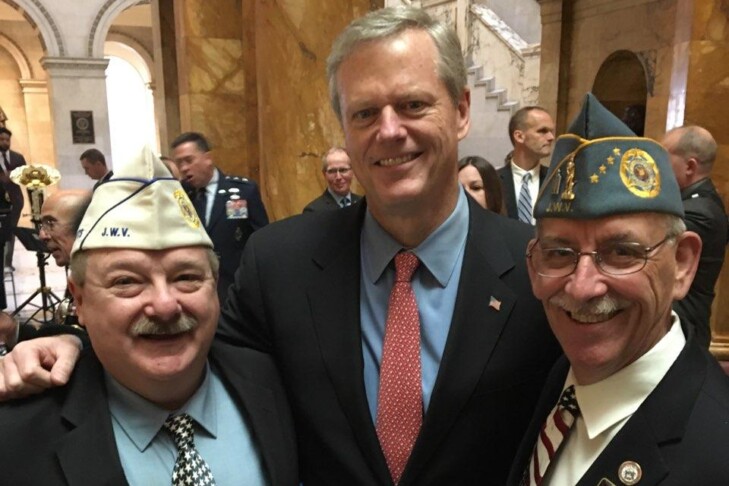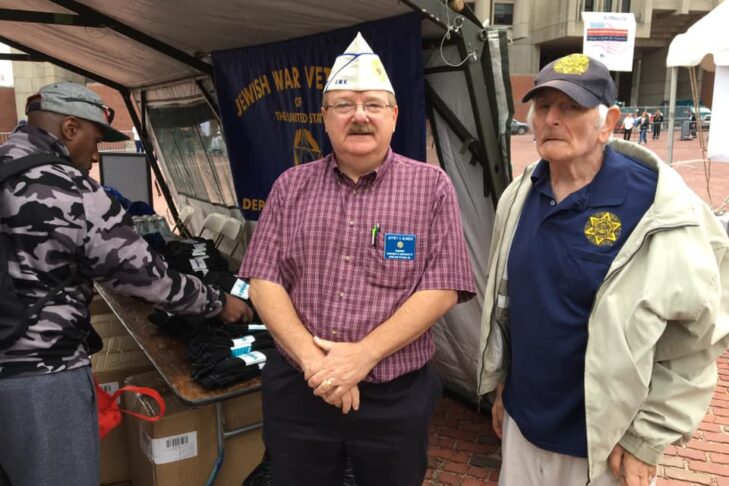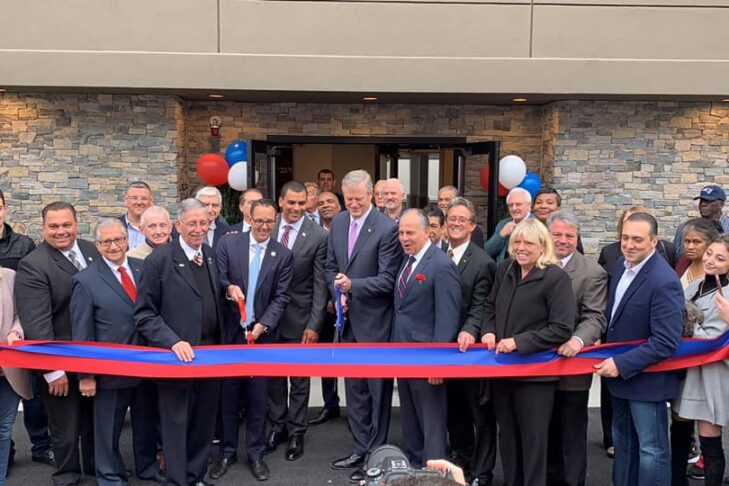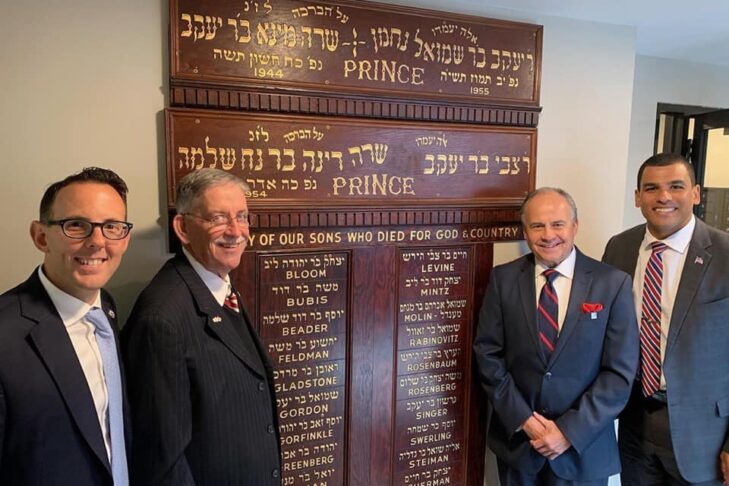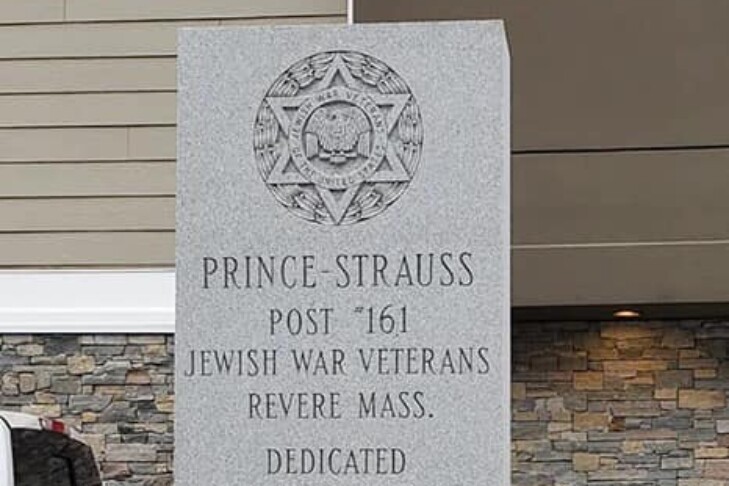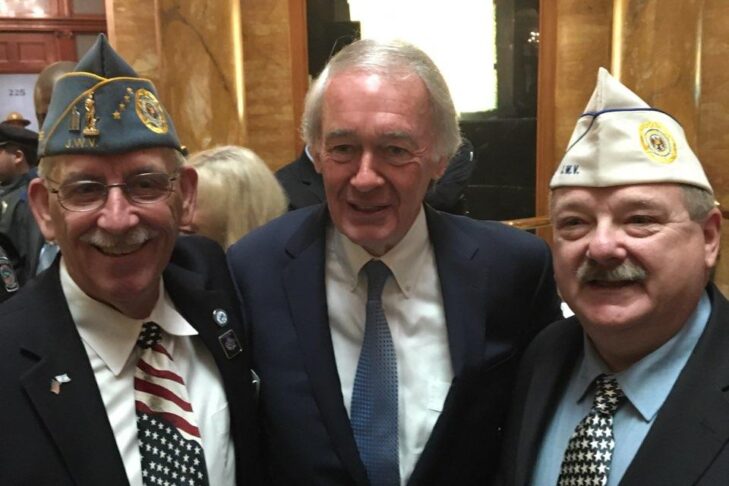Honoring those who have served their country in war and in peace, Jewish War Veterans of Massachusetts (JWV) department commander Jeffrey Blonder was at the State House for the annual Veterans Day ceremonies with Gov. Charlie Baker and Secretary of Veterans Affairs Francisco Urena.
Blonder, an Afghanistan War veteran, represented the Massachusetts JWV, an organization consisting of 13 posts serving 600 Jewish veterans across the Bay State. “A lot of [members] are still from World War II,” he said, noting that other members served in the Korean and Vietnam wars and in “modern-era” conflicts.
“We have posts in Springfield, Pittsfield, Worcester and Leominster, but I would think the majority are within the 495 belt,” Blonder said. Individual posts’ Veterans Day activities included the Peabody post, which participated in the City of Peabody activities and service.
The state JWV is part of a national organization dating to 1896. According to Blonder, it’s the oldest veterans organization in the U.S., as well as the oldest congressionally chartered veterans organization, older even than the American Legion, which turns 100 this year.
“It was founded with two principles in mind,” Blonder said of JWV. “To serve all veterans without regard to race, color, creed or religion, and to fight antisemitism.” He said these guiding principles are “the same today as in 1896.”
At the time of JWV’s founding, Blonder said, there was an erroneous belief that Jews did not serve in the military, a misconception that he said probably persists today. But, he said, whereas Jews represent 2% to 3% of the U.S. population, Jewish participation in the military has historically been estimated at 4%.
That includes Blonder, who served in the Naval Reserve for 28 years, including 15 months in Afghanistan during the War on Terror from 2008 to 2009 as a combat advisor to the Afghan army. He also served as chief of information technology for naval research intelligence in Fort Worth, Texas.
In Afghanistan, Blonder was stationed in the northern city of Mazar-i-Sharif, the nation’s third-largest city and home to the Blue Mosque. His home base was Camp Mike Spann, named for CIA operative Johnny Micheal Spann, the first American killed in action during the U.S. invasion of Afghanistan in 2001.
Blonder described his time in Afghanistan as a “unique situation.” “They had no real central government,” he said. “It was tough teaching leadership … They were still learning to be a nation when I was over there.” As he recounted, he met individuals who had, over a 25-year period, fought with and against the Soviets, and with and against the Taliban. “[Afghanistan] had more survivors than leaders,” he said.
Blonder was the only Jew among the 300 to 400 people at Camp Mike Spann, but, he said, “I tried to do as much as possible,” such as celebrating Hanukkah. “My wife sent a menorah and dreidels,” he said. And, he added, “a couple of times” he flew to the air base at Bagram for Shabbat services with 20 fellow Jews, including civilian contractors, as well as military personnel.
“The good thing about celebrating Shabbat in Afghanistan is that, technically, it’s a dry country that doesn’t believe in alcohol,” Blonder said. “The U.S. has to respect that. They didn’t allow us to drink alcohol, except Concord grape wine for a Friday-night toast. It was the only time I drank, on Shabbat.”
Several years after returning home, Blonder retired in a ceremony aboard the USS Constitution in 2013 with the rank of senior chief petty officer. “It was very thrilling,” he said of the day, which included a turnaround cruise on the historic ship. “It kind of brought the whole thing together. As a little kid, I had gone to the Constitution with my parents. In school, I had raised money to save the Constitution.” And, he noted, during World War II, his mother had worked as a civilian in the Charlestown Navy Yard, home port of Old Ironsides.
Now with JWV, Blonder looks to help fellow veterans, including those who have had a harder time than himself transitioning back to civilian life. “I [was] able to reintegrate into society right away,” he said. He has been on the Swampscott Planning Board for 20 years and involved in Town Meeting for over 30 years, and is currently the Swampscott town constable. But, he said, “A lot of veterans do have issues, do have problems.” He noted that priorities for JWV include “better medical and mental health care,” as well as “[making] sure the VA is adequately funded” and “job opportunities for veterans as they come back.”
JWV members have participated in recent activities meant to help, including a Sept. 6 distribution of 1,250 pairs of socks for homeless veterans in Boston, and the Oct. 4 dedication of 30 one-bedroom housing units for veterans in Revere on the site of the former Congregation Tifereth Israel, with memorials transferred from the shul to the housing honoring congregation members killed in World War II and members who served in the Korean War, and honoring members of Revere’s Prince-Strauss/Groman Post 161. Blonder noted that the housing was aided by Ira Novoselsky, a past national commander of JWV and Revere city councilor.
Blonder also encouraged employers to “hire veterans.”
“There are a lot of skills they bring to the table,” he said. “Leadership, discipline, a sense of mission. It’s very important. They know how to get the job done.”


